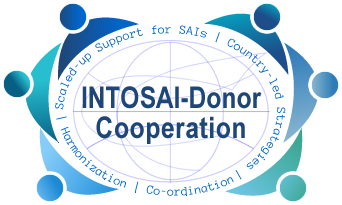IDI Work stream Well Governed SAIs 2024-2029
Good SAI governance is critical to ensuring the sustainable delivery of high-quality audits and other SAI work. It allows SAIs to demonstrate credibility and serve as role models for effectiveness, transparency, and accountability in the public sector. Well-governed SAIs can confidently engage with external stakeholders and effectively address the complex socio-economic challenges they face.
We will support sustainably governed SAIs by ensuring that processes, systems and practices are fit-for-purpose, well-resourced and documented. SAI PMF is a critical enabler as it allows SAIs to get a comprehensive evidence-based picture of performance. We will prioritise working with SAIs for sustainable financial and human resource management, aligned to their strategic and annual plans. Under TOGETHER, we will work with SAIs on improving recruitment, performance management and other HR practices. We will collaborate with SAIs to integrate sustainability aspects into their reporting, setting an example for other public sector organisations. By emphasising foresight through risk management and leadership development via initiatives such as CRISP, MASTERY and the SAI Governance Academy, we aim to future-proof SAI governance.
Strengthening ICT governance through pICTure lies at the heart of our digitalisation efforts. We will assist SAIs assess their ICT maturity levels and build ICT development into their strategies and operational plans. We will support SAIs to develop professional ICT staff capacities and faciltate SAI change processes through global and regional pools of ICT specialists. In addition, our digital tools, e-SAI PMF and STORY, promote efficient assessment and management processes.
Mastering leadership skills
The MASTERY initiative will continue being a unique platform for SAI leaders to gain new knowledge and perspective and exchange views on critical topics. We will aim to scale up MASTERY roll-out in terms of topics and languages. MASTERY will be supported by the SAI Governance Academy, targeting mid-level SAI management staff to provide a concentrated version of the Well-Governed SAI portfolio.
Public trust in SAIs can be enhanced whenever SAIs can demonstrate good governance, transparency and accountability. Skilled and inclusive SAI leaders are indispensable in this regard. The work stream will support SAI credibility and resilience through its focus on prudent resource and risk management, as well as on building strong ethical systems. Assessing stakeholders’ views and expectations, an integral part of SPMR, promotes not only the realism and relevance of the SAI’s strategic plans, but also enables the SAI to confidently engage with its environment. Given the connection between SAI governance and independence, we plan to provide targeted SAI-level support for accelerated and sustainable performance improvements in these areas with a strong focus on working with CSOs.
SAIs connected to this project
- Afghanistan
- Albania
- Algeria
- American Samoa
- Andorra
- Angola
- Anguilla
- Antigua and Barbuda
- Argentina
- Armenia
- Aruba
- Australia
- Austria
- Azerbaijan
- Bahamas
- Bahrain
- Bangladesh
- Barbados
- Belarus
- Belgium
- Belize
- Benin
- Bermuda
- Bhutan
- Bolivia
- Bosnia and Herzegovina
- Botswana
- Brazil
- British Virgin Islands
- Brunei
- Bulgaria
- Burkina Faso
- Burundi
- Cabo Verde
- Cambodia
- Cameroon
- Canada
- Cayman Islands
- Central African Republic
- Chad
- Chile
- China
- Colombia
- Comoros
- Cook Islands
- Costa Rica
- Côte d'Ivoire
- Croatia
- Cuba
- Cyprus
- Czech Republic
- Democratic Republic of the Congo
- Denmark
- Djibouti
- Dominica
- Dominican Republic
- Ecuador
- Egypt
- El Salvador
- Equatorial Guinea
- Eritrea
- Estonia
- Eswatini
- Ethiopia
- European Court of Auditors
- Federated States of Micronesia
- Fiji
- Finland
- France
- French Polynesia
- Gabon
- Georgia
- Germany
- Ghana
- Greece
- Grenada
- Guam
- Guatemala
- Guinea
- Guinea-Bissau
- Guyana
- Haiti
- Holy See / Vatican City State
- Honduras
- Hungary
- Iceland
- India
- Indonesia
- Iran
- Iraq
- Ireland
- Israel
- Italy
- Jamaica
- Japan
- Jordan
- Kazakhstan
- Kenya
- Kiribati
- Korea (Democratic People's Republic of)
- Korea (Republic of)
- Kosovo
- Kuwait
- Kyrgyz Republic
- Laos
- Latvia
- Lebanon
- Lesotho
- Liberia
- Libya
- Liechtenstein
- Lithuania
- Luxembourg
- Madagascar
- Malawi
- Malaysia
- Maldives
- Mali
- Malta
- Marshall Islands
- Mauritania
- Mauritius
- Mayotte
- Mexico
- Moldova
- Monaco
- Mongolia
- Montenegro
- Montserrat
- Morocco
- Mozambique
- Myanmar
- Namibia
- Nauru
- Nepal
- Netherlands
- Netherlands Antilles
- New Caledonia
- New Zealand
- Nicaragua
- Niger
- Nigeria
- Niue
- North Macedonia
- Northern Mariana Islands
- Norway
- Oman
- Pakistan
- Palau
- Palestinian Territories
- Panama
- Papua New Guinea
- Paraguay
- Peru
- Philippines
- Poland
- Portugal
- Puerto Rico
- Qatar
- Republic of the Congo
- Romania
- Russian Federation
- Rwanda
- Samoa
- São Tomé and Príncipe
- Saudi Arabia
- Senegal
- Serbia
- Seychelles
- Sierra Leone
- Singapore
- Slovakia
- Slovenia
- Solomon Islands
- Somalia
- South Africa
- South Sudan
- Spain
- Sri Lanka
- St. Helena
- St. Kitts-Nevis
- St. Lucia
- St. Vincent and Grenadines
- Sudan
- Suriname
- Sweden
- Switzerland
- Syrian Arab Republic
- Tajikistan
- Tanzania
- Thailand
- The Gambia
- Timor-Leste
- Togo
- Tokelau
- Tonga
- Trinidad and Tobago
- Tunisia
- Turkey
- Turkmenistan
- Turks & Caicos Islands
- Tuvalu
- Uganda
- Ukraine
- United Arab Emirates
- United Kingdom
- United States of America
- Uruguay
- US Virgin Islands (St. Thomas)
- Uzbekistan
- Vanuatu
- Venezuela
- Viet Nam
- Wallis and Futuna
- Yemen
- Zambia
- Zimbabwe
